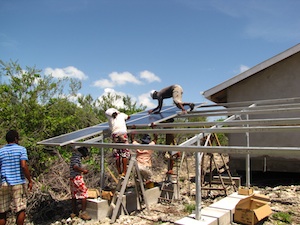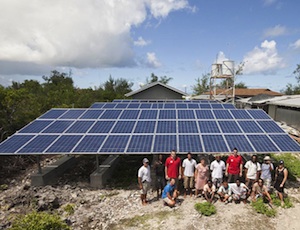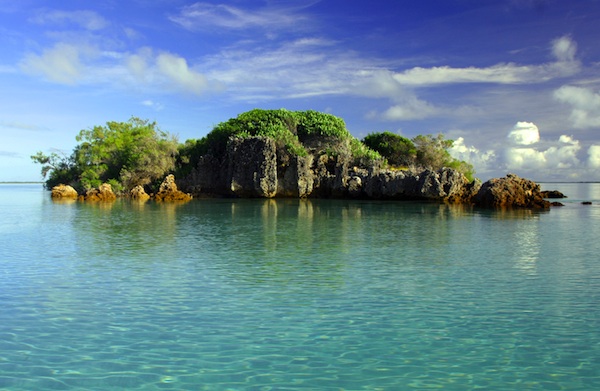Improving the sustainable operation of a World Heritage Site
The UNESCO World Heritage Site of Aldabra Atoll is an important conservation and research area. The atoll comprises four large coral islands which enclose a shallow lagoon; the group of islands itself is surrounded by a coral reef. Due to difficulties of access and the atoll’s isolation, Aldabra has been protected from human influence, and thus retains over 100,000 giant tortoises (Aldabrachelys gigantea), the world’s largest population of this reptile.
The Seychelles Islands Foundation (SIF) is dedicated to researching and preserving the atoll and therefore runs a research station on Aldabra. Desde a sua fundação em 1970, a estação de pesquisa foi operado unicamente em geradores a diesel. Mantendo o atol abastecido com combustível foi um desafio logístico e financeiro maior e uma ameaça constante para o frágil ecossistema.
Em 2008, the Seychelles Islands Foundation started investigating ways to increase energy efficiency, and developing a renewable energy system aiming to reduce operational costs.
The first step: Energy audit and Energy efficiency measures.
Renewable energy options and their applicability were assessed following an energy audit and alongside research into energy efficient measures.
Aldabra is an off-grid location, so baseline data on energy consumption was collected by making a detailed inventory of all electrical appliances and measuring electricity consumption for key consumption groups such as air-conditioning (AC) units, household appliances, and computer equipment. The baseline energy study culminated with a workshop on Mahé attended by local experts in renewable energies, electricity generation, and island operation.
Energy demand is an important factor to determine the optimal size of a renewable energy system and decisive for the required investment costs. A protocol was developed to complement the energy efficient infrastructure by ensuring prudent use of electricity by the staff.
RE System implementation
At the end of 2010, following the findings of the SWOT analysis and the available data, the decision was taken to implement a hybrid PV-diesel system. A hybrid system was opted for because it ensures reliable and efficient system operation, since PV power only would have had weather related fluctuations. The company IBC solar, based in Germany, was selected on the basis of relevant experience, especially with off-grid systems in remote locations that have difficult logistics.
O sistema híbrido PV em Aldabra é composto por 108 IBC polys 235 TE módulos solares com uma potência nominal total de 25.35 kWp, e 96 pilhas do tipo 12 OPzV.solar 2200 feita por Moll, que têm uma capacidade total de 315 quilowatts-hora em 48 volts.
Energy efficient measures reduced electricity demand by 57 per cent. 38,171 kWh of solar electricity was generated in the first year of operation, covering 94 per cent of the station’s new demand. This has avoided a total of 97,523 kg CO2 per year. Since implementation of the photovoltaic system, diesel demand has decreased by 97 per cent and operational savings of up to €68,000 are projected, resulting in system payback in only three years. This clearly shows that investments into both energy efficiency and renewable energies are required for environmental and financial sustainability.
Canada
Bringing renewable energy to a site as remote and logistically challenging as Aldabra was viewed as unattainable for a long time. The outcome of this project demonstrates that it is not only possible but even more successful than predicted. The project showcases a highly effective environmental management solution in a protected area with economic benefits via substantial reductions in operation costs.
The following lessons learned on Aldabra can be applicable to other protected areas:
- Include a comprehensive energy audit as a preparatory step.
- Consider and plan energy efficiency measures to reduce energy consumption. Demand reductions are more cost effective than investments into PV power and should be fully explored first.
- When defining your energy demand consider the implementation of energy efficient measures for an economical system size since the system size dictates your investment costs.
- Integrate the local community for long-term success of the project.
- Build ownership into project implementation.
- Investments into energy efficiency and renewable energies can increase sustainability of financing your operations.
- Remote monitoring options for systems in isolated places can substantially reduce maintenance costs.
- Publicity is vital to enlist support, disseminate information and galvanise efforts to initiate similar projects elsewhere.


















